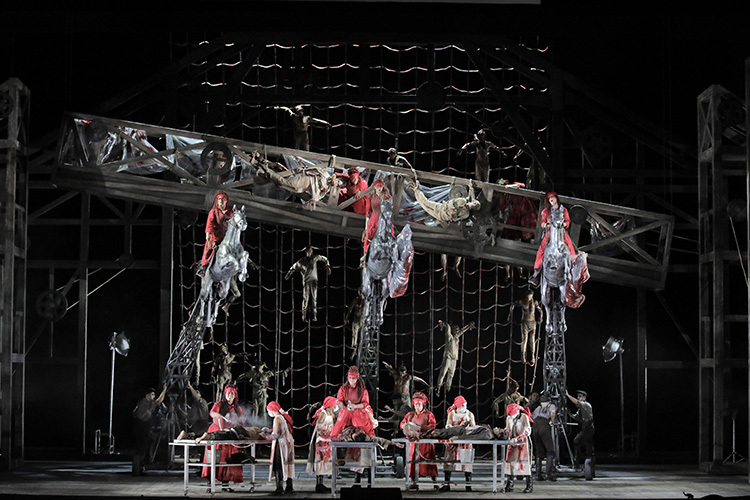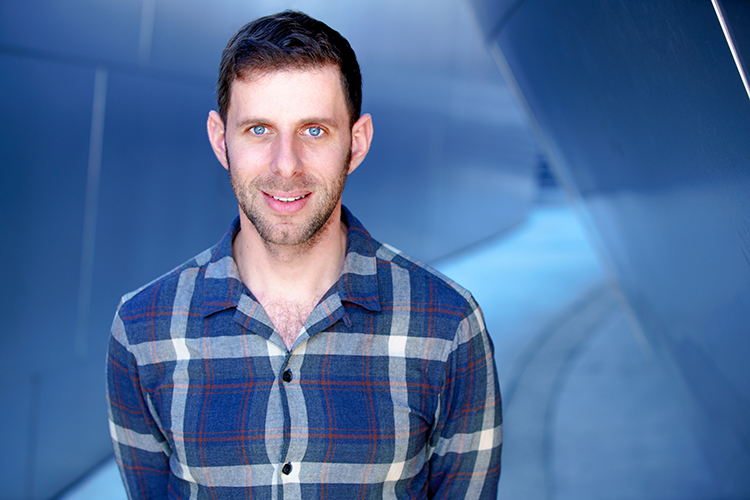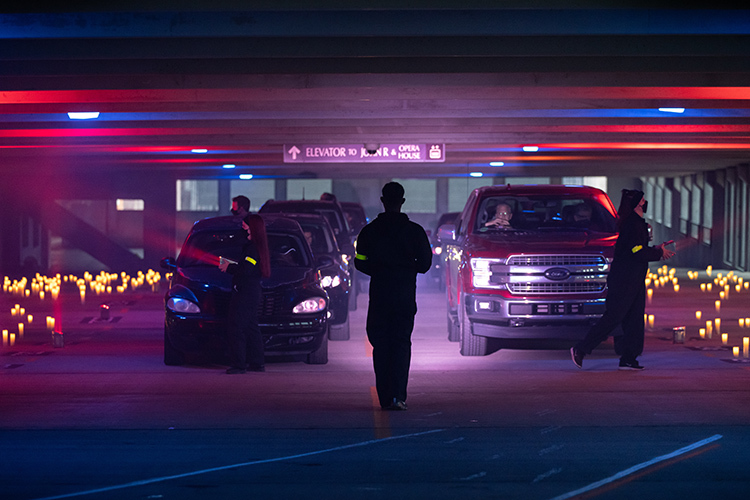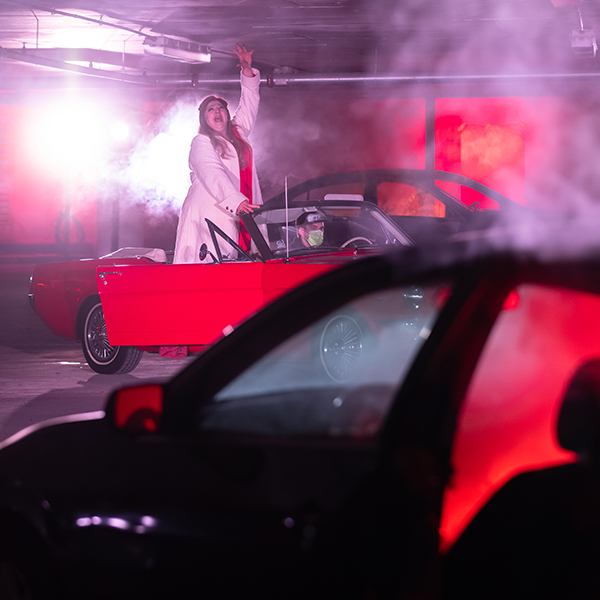April 12, 2021
Ride of the Spectators: Out of the Opera House and Into the Car
Moving beyond the opera house in 21st-century American opera
Opera is a messy genre. The many elements that make up an operatic production—voice, orchestra, staging, scenery, narrative—surge up against one another, sometimes aligning, and sometimes taking center stage in turn. This is one of the reasons operatic performance can be both overwhelming and exciting. The whole is often exceeded by a mass of parts that diverge and converge as the performance takes place.
A seldom-mentioned aspect of operatic performance is the opera house itself. This operatic convention represents far more than just the building that contains the messiness: the opera house concretizes particular relationships between sight and sound. Spectating within a traditional theater, such as the Lyric Opera House with its proscenium arch separating viewers from performers, requires staging, singing and listening that prioritize the needs of audience members observing the performance variously from the front and sides of the stage. The production must consider those audience members seated in the furthest balconies and those in the first rows of the orchestra. By contrast, performances in non-traditional spaces offer different and often more proximate ways of listening and watching.

Lyric's 2017/18 production of Die Walküre on the Lyric Opera stage.
When an opera is created for a space beyond the walls of the traditional opera house—in, say, a parking garage—the other elements of the genre, including the spectator, appear in novel relation to one another. Instead of seeing the staging in front of you, you might be surrounded by performers who make you feel as though you are a part of the story. Rather than listening to an acoustic performance in a grand hall, you might turn on your car radio and employ listening practices that echo your pre-COVID-19 morning commute. You may be asked to sit close enough to a baritone that you see his rib cage expand and contract as he breathes between phrases.
Performances that take place beyond the walls of the opera house frequently upend the traditional hierarchies of operatic spectatorship and point to reinterpretations of the genre as a whole. New modes of performance offer the opportunity to rethink what it means to access and engage with the operatic genre and indeed, to reckon with its complex history.
While these new modes of performance have long been a part of fringe operatic production in Europe, it has only been in the past 10 to 15 years that these approaches have proliferated across the United States and Canada. Companies such as the Toronto-based Against the Grain Theatre, the New-York-based company On Site Opera, the producer Beth Morrison Projects (also based in New York), and Los-Angeles-based experimental opera company The Industry have expanded the narratives, voices, and sounds that have traditionally been excluded from certain operatic spaces. Utilizing techniques first popularized by immersive theatrical companies such as Punchdrunk and Third Rail Productions, these companies have presented a range of experimental and canonic works alike. From Against the Grain’s re-imagination of Mozart’s Così fan tutte as A Little Too Cozy, performed at the CBS Studio in 2015, to Beth Morrison Projects’ black-box production of Ted Hearne’s The Source, to On Site Opera’s one-on-one pandemic telephone performances, United States and Canadian opera has moved beyond the walls of the opera house in myriad ways and to great effect.
Alternative modes of production also frequently allow up-and-coming, often younger composers, performers and directors to more easily access venues and audiences. By moving out of the opera house, emerging professionals are able to experiment with new ways of presenting sound and narrative. In so doing, these musicians are frequently responding to what they see as stultifying performance practices and repertories.

Yuval Sharon, who conceived and directed Twilight: Gods.
Particularly important in the history of alternative operatic productions in the United States are the productions of The Industry, an experimental opera company founded by Yuval Sharon, newly appointed as both artistic director of Michigan Opera Theatre (MOT) and creative catalyst of Lyric Opera of Chicago. Founded in 2012, The Industry is an “independent, artist-driven company creating experimental productions that expand the definition of opera.” Part of the reason The Industry’s productions are distinctive is because they capitalize on the unique spectatorial possibilities of the operatic genre. In other words, these productions use the “messiness” of opera as a means of challenging how audiences encounter the genre as a whole.
While the company’s 2013 production of composer Christopher Cerrone’s Invisible Cities was performed in L.A.’s Union Station, this was hardly the most unique component of the performance. Audience members were given wireless headphones to hear the opera while they wandered the space of the performance, listening to and locating the performers as the opera progressed. The company’s 2015 production of Hopscotch took place in limousines in which small groups of spectators viewed the opera, while others viewed the performance from the Central Hub, a gathering space specially constructed for the opera. At the Central Hub, segments of each part of the opera were played again and again as limousine-based audience members livestreamed each scene from various Los Angeles locations.
The company’s 2020 production, Sweet Land, used the lens of spectatorship itself as a way of confronting historical revisionism and the violent legacy of coloniality. Sweet Land was created by a prize-winning team of composers, performance and installation artists, and poets, and co-directed by Sharon and interdisciplinary artist Cannupa Hanska Luger. This collaboration demonstrated the necessity—among other things—of foregrounding a multiplicity of voices and experiences in “re-presenting” a historically white performance genre.

Michigan Opera Theatre's production of Twilight: Gods.
The new modes of production described here also offer a dramatic way of engaging with traditional “in-house” operatic performance. In other words, removing opera from the opera house gives traditional institutions the opportunity to rethink other institutionalized components of the genre. Companies such as Opera Philadelphia, Opera Omaha, the Canadian Opera Company, San Francisco Opera, and now, most dramatically, Lyric and MOT, have drawn on techniques from the experimental opera playbook to rethink their relationship with their communities and the genre of opera itself.
Of course, I’m wary of suggesting that alternate modes of performance are a cure-all to some of the problems inherent in opera. These works can reproduce some of the hierarchies and inequalities of the genre that take place in the house, and crucially, all companies must be aware of the types of spaces into which these performances are brought. Opera is not an innocent ambassador; it is an art form with a complex history. Likewise, I am not proposing that these experimental production strategies replace traditional forms of presentation or repertories entirely. Opera in and out of the opera house constitutes a genre in dialogue with itself; we need both forms, and those forms that have yet to be imagined.
What to call these emerging forms of operatic performance?
In the six years I have been researching and writing about opera sans house, I have considered many terms: “Indie Opera,” The Industry’s “experimental opera,” the forms of “site-specific opera” that regional opera companies across the United States have incorporated into their seasons, and even “Alt-Op,” as a way of expressing alternate systems enabled by a keystroke.
For now, though, influenced by Sharon’s own approach, I’ve settled on opera. This is, in fact, what is so fascinating about the direction that Lyric has taken in welcoming Sharon into the company. Twilight: Gods is not just opera for the COVID-19 era; it is an acknowledgment of the ways operatic performance both in and out of the house will constitute the genre for the future. By recognizing what Lyric is doing as opera, not opera by another name, we remind ourselves that opera has, in fact, long been a genre in dialogue with itself. We are just spectators in the house—and in the car.
Megan Steigerwald Ille is an Assistant Professor of Musicology, Educator, at the College-Conservatory of Music, University of Cincinnati. Her research on the 21st-century U.S.-American opera industry considers the intersections of operatic, popular and digital cultures. She has articles forthcoming in the Journal of the Society for American Music and The Opera Quarterly. Her monograph-in-progress, Opera for Everyone: Experimenting with American Opera in the Digital Age, is an ethnographic study of the experimental opera company, The Industry.
Twilight: Gods
Twilight: Gods
Experience an original film that captures Lyric's sold-out Chicago premiere of Twilight: Gods, a reimagining of the final chapter of Wagner's epic Ring cycle.
Filmed during the live production at Millennium Park Lakeside Garage in Spring 2021, this unique, drive-through experience was conceived by director Yuval Sharon, who wrote the new English texts, and features poetic transitions written and performed by Chicago interdisciplinary artist avery r. young. Chicago filmmaker Raphael S. Nash has created this original new feature from the critically-acclaimed production and it showcases the performances, video work and installations brought to life by singers, instrumental groups, and actors.

